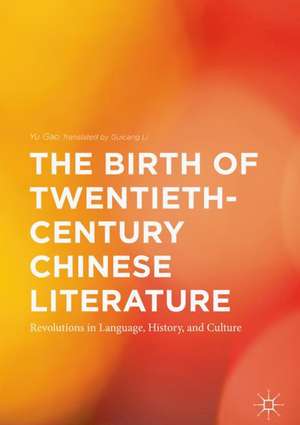The Birth of Twentieth-Century Chinese Literature: Revolutions in Language, History, and Culture
Autor Yu Gao Traducere de Guicang Lien Limba Engleză Hardback – 10 oct 2017
Preț: 640.24 lei
Preț vechi: 753.22 lei
-15% Nou
Puncte Express: 960
Preț estimativ în valută:
122.53€ • 126.84$ • 103.56£
122.53€ • 126.84$ • 103.56£
Carte tipărită la comandă
Livrare economică 06-20 martie
Preluare comenzi: 021 569.72.76
Specificații
ISBN-13: 9781137565297
ISBN-10: 1137565292
Pagini: 202
Ilustrații: XIV, 202 p.
Dimensiuni: 148 x 210 mm
Greutate: 0.41 kg
Ediția:2018
Editura: Palgrave Macmillan US
Colecția Palgrave Macmillan
Locul publicării:New York, United States
ISBN-10: 1137565292
Pagini: 202
Ilustrații: XIV, 202 p.
Dimensiuni: 148 x 210 mm
Greutate: 0.41 kg
Ediția:2018
Editura: Palgrave Macmillan US
Colecția Palgrave Macmillan
Locul publicării:New York, United States
Cuprins
Division of Literary Periods, Theory, and Awareness of Problems.- Language Reform and the Transformation of Modern and Contemporary Chinese Literature.- Critique of the Theory on Baihua Writing.- The Baihua Movement and Ideological Revolution.- Foreignization and Assimilation: Translated World Literature and Modern Chinese Literature.- Nothing but Culture: The Pen War between Hu Shi and the Conservative Xueheng School.- Lu Xun’s View of Language, His Writing and Its Relation to Modern Chinese Literature.- Hu Shi and Lu Xun: Pioneers of Modern Chinese Literature.
Notă biografică
Dr. Yu Gao is Professor of Chinese at Zhejiang Normal University, author and co-author of more than 20 books including History of Modern and Contemporary Chinese Literature and Reflections on Literary Issues, and A Discursive Approach to Literary Issues. He has published hundreds of articles on Chinese and foreign literature.
Dr. Guicang Li is Professor of English at Zhejiang Normal University, author of Championing Chinese Ethnicity: Sui Sin Far and Her Writing, and The Weight of Culture: Contemporary Chinese American Literature and Chinese American Identity, and translator of many books including Ursula Heise’s Sense of Place and Sense of Planet.
Dr. Guicang Li is Professor of English at Zhejiang Normal University, author of Championing Chinese Ethnicity: Sui Sin Far and Her Writing, and The Weight of Culture: Contemporary Chinese American Literature and Chinese American Identity, and translator of many books including Ursula Heise’s Sense of Place and Sense of Planet.
Textul de pe ultima copertă
This study makes a linguistic case for the twentieth century revolution in Chinese language and literature. It offers a history of reform and change in the Chinese language throughout the country’s history, and focuses on the concept of ‘baihua’, a language reform movement championed by Hu Shi and other scholars which laid the foundation for the May fourth New Literature Movement, the larger New Culture Movement and which now defines modern Chinese. Examining the differences between classical and modern Chinese language systems alongside an investigation into the relevance and impact of translation in this language revolution - notably addressing the pivotal role of May Fourth leader Lu Xun - this book provides a rare insight into the evolution of the Chinese language and those who championed its development.
Caracteristici
Offers a linguistic perspective on the twentieth century revolution in Chinese language and literature Explores the concept of ‘baihua’, a language reform movement which laid the foundation for the May fourth New Literature Movement Considers the role and impact of translation in the Chinese language revolution
